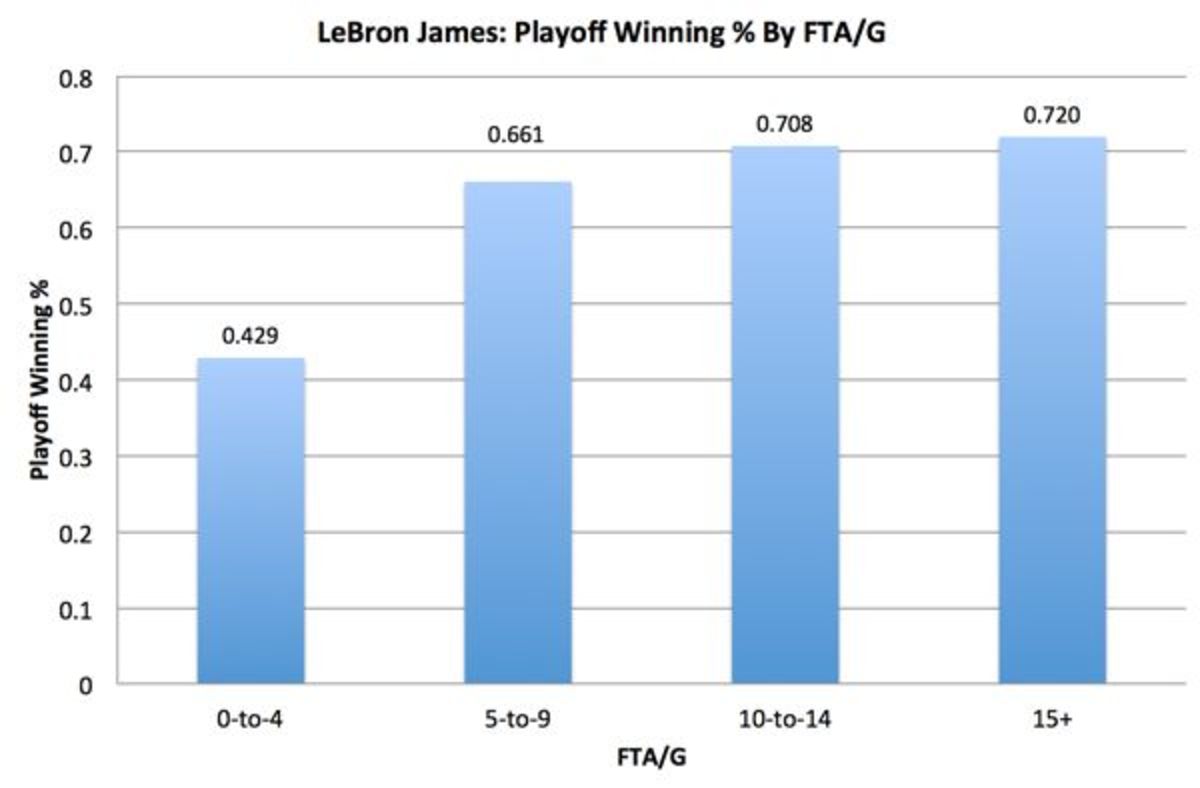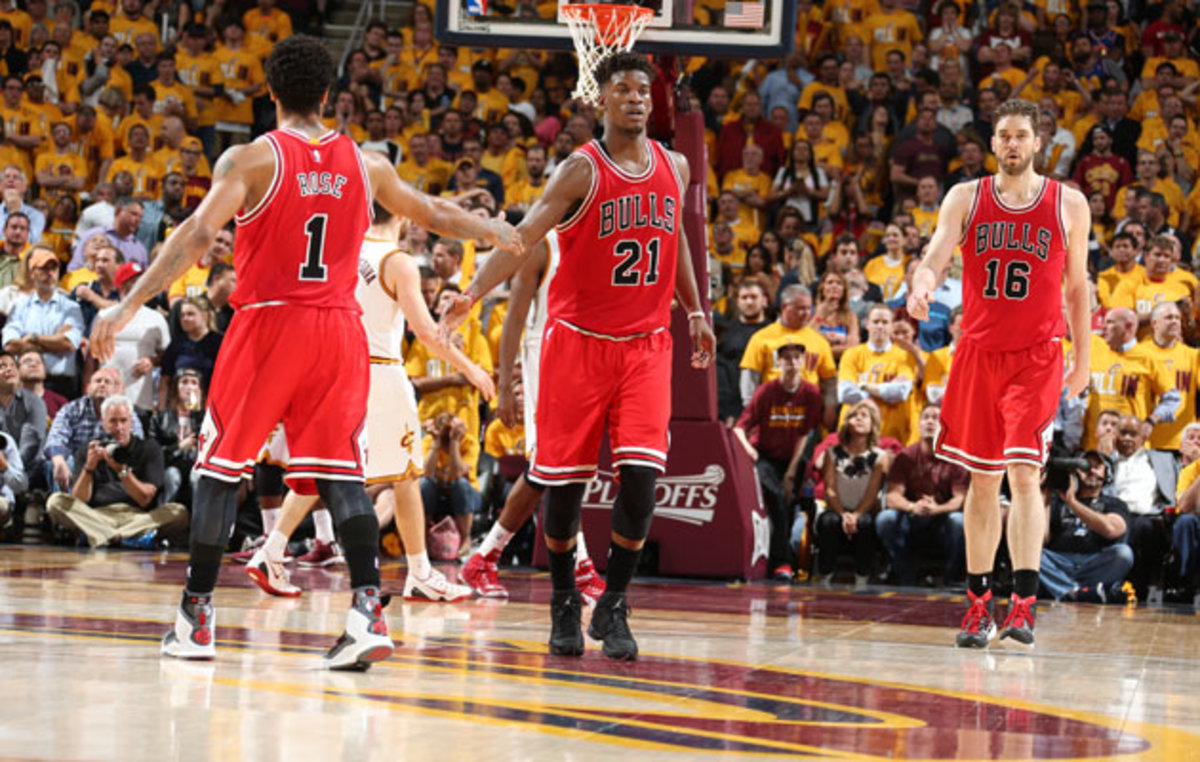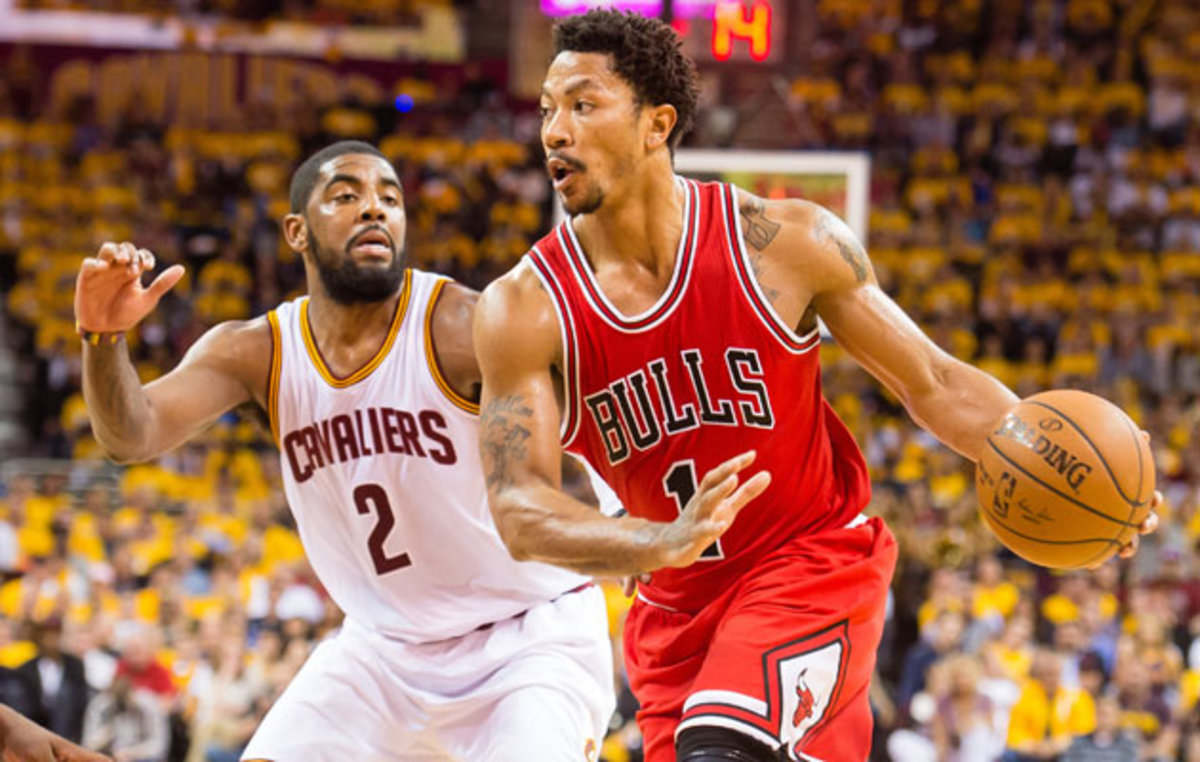LeBron James' bounce-back history bodes well for Cavaliers in Game 2

CLEVELAND—Three things to watch for when the Cavaliers host the Bulls on Wednesday night (7 p.m. ET, TNT), looking to avoid an 0-2 deficit in their second-round series. Game 2 will mark the second consecutive game Cleveland has played without Kevin Love and J.R. Smith. The Cavaliers will shake up their starting lineup, shifting Tristan Thompson into the starting fivetonight.
LeBron James at the stripe
Much of the talk after Chicago's 99-92 victory in Game 1 has centered on, surprise surprise, LeBron James. During his post-game press conference, James told reporters that he "didn't play very well," and on Tuesday added that he had an "off night," pointing to his "unacceptable" 9-for-22 shooting. James shot just 3-for-12 from outside the basket area, and he committed six turnovers on a night where he started slow and never reached sixth gear. Yes, it's strange to write those words about a player who posted 19 points, 15 rebounds and 9 assists, but such is James' singular standard.
Rose, Bulls shoot their way past shorthanded Cavaliers in Game 1
James pledged to changed his mindset after "feeling out" Game 1, and that process should begin with his downhill attacks. Look for James to attack early in Game 2; he didn't attempt a shot in the basket area during the first quarter on Monday, and he wound up attempting just two free throws the entire night. Even though James isn't the foul-drawing machine he was during his first Cleveland stint—when he got to the line more than 10 times per game in 2005-06, 2007-08 and 2009-10—he still finished fourth in free throw attempts this season (averaging 7.7 attempts overall in 2014-15 and 6 attempts per game during the four games against the Bulls). Without key complementary scorers Kevin Love (injury) and J.R. Smith (suspension) in the lineup, we should be seeing James' free throw attempts spiking, not flat-lining.
Although Cavaliers coach David Blatt is doing his best to frame this series as anything but "James vs. the World," this group as constructed is only going as far as James drags it. Throughout James' career, the numbers are pretty clear: his teams struggle if he doesn't get to the line. Remember, the highest-profile failure of his career came in the 2011 Finals against Dallas, when he attempted fewer than five free throws in each of the six games and faced criticism that he was "shrinking" under the pressure. Overall, James' teams are 12-16 (.429) in the playoffs when he attempts fewer than five free throws, including Monday, a far cry from his overall postseason record of 105-58 (.644). Here's a further dissection of those numbers that lays out the direct—and logical—relationship between James' trips to the line and his team's postseason success.

The concern for the Cavaliers is that their small-ball approach forces James to expend more energy by defending bigger players and taking on additional rebounding responsibilities, which could have influenced his Game 1 approach on offense. This is yet another case where James will simply have to pick up the slack rather than expect meaningful help from his supporting cast. Irving is the only other ball-handler on the roster capable of regularly getting to the line, and Smith's return in Game 3 can't be counted on to turn the tide. (Amazingly, Smith averaged 7.3 three-point attempts against just 0.7 free-throw attempts with the Cavs during the regular season.)
• MORE NBA: Schedule | Grades | Awards | Playoff coverage | Finals picks
There are a number of potential secondary benefits if James gets back to the line at his usual clip: Any foul trouble for Jimmy Butler or Pau Gasol would help simplify things immensely for Cleveland's defense; Cleveland's tertiary shooters, who mostly struggled in Game 1, would enjoy cleaner looks if James commands extra attention inside; and Irving's attack game should open up if James finds more success as a No. 1 option.
The good news for Cavaliers fans: James' track record aligns with the general perception that he has an innate feel for ramping up his assertiveness when it's needed. During his 163-game postseason career, the only time that James has attempted fewer than five free throws in consecutive losses within a series came during the final three games of those 2011 Finals. For what it's worth, James shot just 5-for-15 and got to the line four times in Game 1 of the 2011 East finals against Chicago, only to bounce back with a game-high 29 points (including seven free-throw attempts) in a Game 2 win. Cleveland, obviously is hoping history repeats itself Wednesday.
The buttoned-up Bulls are doing their best to avoid providing James added motivation, with coach Tom Thibodeau repeatedly bracing James' Game 1 effort on Tuesday, while Butler braced for more. "I guess [James] thought he didn't play well," Butler said. "He did miss shots that he normally makes. I don't feel like I played too well either. I missed some shots I normally make. That's what film is for. ... I expect to see the same thing [in Game 2 that] I saw in Game 1: [James] being aggressive."

Can Chicago's Big 3 keep clicking?
The Bulls' offense garnered plenty of attention for Game 1, and rightfully so. Their 32-point third quarter was especially electric, with Derrick Rose, Butler and Gasol all taking turns getting in on the action.
Indeed, Monday marked just the fourth time this season that Rose, Butler and Gasol each topped 20 points in the same game. The previous outings: a Nov. 13 win over the Raptors, a Christmas Day win over the Lakers, and a Jan. 16 win over the Celtics. Sustaining that type of productivity and balance will prove difficult, but it provided an extended peek at the Windy City's wildest dreams: a Bulls team potent enough to win the East for the first time since Michael Jordan retired (for the second time). "It's tough because we have so many offensive weapons," Gasol said. "You always have to give something up. ... It's a difficult cover for anyone when we're willing to move the ball and make plays for each other, which we are. We're passing the ball extremely well."
Jimmy Butler: Running The Gauntlet
Blatt will hope for Chicago's shooting to cool off, but he has to take away something too. His planning will need to start with James, who opened on Joakim Noah in Game 1. Is this the best use of James' talents, given that Noah doesn't look right and finished scoreless in 29 minutes? Can Blatt continue to allow Rose and Gasol to run a two-man game against Irving and Tristan Thompson with James as a bystander?
MORE NBA: SI's best magazine stories from 2014-15 NBA season
The most practical approach for the Cavaliers is probably to make limiting Gasol the top priority, as his points came easily and repeatedly took Cleveland's shaky team defense out of its comfort zone. That could mean conceding even more perimeter looks to Rose, Butler and Mike Dunleavy, who started very hot in Game 1, but the Cavaliers just don't have the personnel to plan as if they are going to take away everything. In particular, forcing Rose to beat you with his jumper is a calculated risk worth taking even more often: he shot just 28% on mid-range jumpers, 38.1% on long twos and 28% on long twos, and he hit multiple high degree-of-difficulty shots on Monday. If greater concessions need to be made, that's the place to start.
Update: The decision to start Thompson -- first reported by Cleveland.com on Wednesday -- frees James from the heavier lifting involved in defending the four position and allows Blatt to use James and Shumpert, his two best perimeter defenders, in matchups with Rose and Butler. It also matches traditional size with traditional size inside. However, the front-loading move really exposes Cleveland's second-unit defense, and will require Thompson to play gigantic minutes (he logged 37 minutes in Game 1) and/or the use of Kendrick Perkins, neither of which is ideal.
Blatt's bet is that restoring James to his traditional position and getting his best players on the court early is more important than maximum theoretical spacing. That's a reasonable conclusion, given Chicago's strong performance when Mike Miller was on the court as a Cleveland starter and Cleveland's +14 mark during the 15 minutes that Thompson and Timofey Mozgov were on the court together in Game 1. That said, James and his new mentality will now be facing tighter paints whenever he attacks, and the Cavaliers will be vulnerable to bigger nights from Bulls' reserves like Taj Gibson (8 points and 5 rebounds in Game 1) or Nikola Mirotic (who barely played on Monday). As noted above, Cleveland didn't really stop any of Chicago's primary options in Game 1, so firming up its defensive plan against the Bulls' stars had to be the top priority. Blatt concluded that it should take precedence over pursuing the balance between first and second units which deeper teams have the luxury of seeking.

Rose's rest tends to impact his play
Daring Rose, a former MVP, to beat you is stressful business because he's talented enough to do it. His consistency, however, remains an open question.
SI Vault: Second coming in the second city: Derrick Rose's rise to 2011 MVP
Since returning from his latest knee surgery in early April, Rose has yet to score 20+ points or shoot better than 42% in back-to-back games. The "old Derrick Rose" keeps taking turns with "post-surgery Derrick Rose," something that is expected given how many times he's been under the knife in recent years. Rose, for his part, reports feeling just fine in advance of Game 2, noting that an apparent shoulder injury he suffered during Game 1 was just a "stinger" that shouldn't bother him going forward.
Rose's shooting has improved this season with extra rest days.
- 0 days of rest: 35.5 FG%, 21.4 3P%, 14.9 PPG, 90 Off. Rating
- 1 day of rest: 40 FG%, 30.7 3P%, 18.8 PPG, 98 Off. Rating
- 2 days of rest: 46.1 FG%, 28.1 3P%, 18.3 PPG, 112 Off. Rating
- 3+ days of rest: 45.6 FG%, 30.2 3P%, 18.4 PPG, 100 Off. Rating
Interestingly, Rose's usage rate—how often he calls his own number—doesn't change much based on his amount of rest, even though his efficiency swings up when he's enjoyed extra recovery time. Note that Rose had three days off before Game 1 and will have just one rest day between Games 1 and 2.
The chatter around Rose's rest increased in volume during an up-and-down first-round series with the Bucks, and it figures to continue during this series, which will go every other day until Game 7, which would take place after a two-day break. Rose, for his part, said Tuesday that he sticks to his same routines regardless of the schedule. "That's the great thing about the playoffs," he said. "If I'm not scoring or [if I'm] having a bad game, you have to figure things out. I can't go into a game having that thought [about rest] in my mind. ... My routine don't change for anything. ... I think I'm in a good routine right now."
